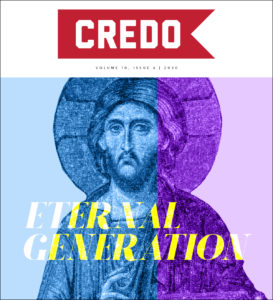Each advent season, my family enjoys singing classic Christmas hymns. One Christmas, however, our family made a disturbing discovery. As we were singing, O Come, All Ye Faithful, my wife started singing a stanza the rest of us did not have in our hymnals. She was singing from the Trinity Hymnal and the second stanza is the Nicene Creed almost verbatim:
God of God, Light of Light, …
God begotten, not created.
As she sang, the rest of us looked up at her and then back down at our Baptist Hymnals only to realize someone had removed that stanza altogether. To this day I have no idea why. But the discovery did make me wonder, How many generations of Christmas singing churchgoers have been robbed of this core confession?
 The average evangelical churchgoer today has never heard of eternal generation. It rarely if ever makes its way into the pulpit. Nor does it make an appearance in many church confessions. And, as you now know, it’s not likely to keep a tune…even if it’s a Christmas tune about Christ himself. But that was not always the case. The early church fathers considered eternal generation a first principle, essential to the Trinity, even indispensable for a biblical view of salvation history.
The average evangelical churchgoer today has never heard of eternal generation. It rarely if ever makes its way into the pulpit. Nor does it make an appearance in many church confessions. And, as you now know, it’s not likely to keep a tune…even if it’s a Christmas tune about Christ himself. But that was not always the case. The early church fathers considered eternal generation a first principle, essential to the Trinity, even indispensable for a biblical view of salvation history.
So, what is eternal generation? The word “generation,” says Thomas Aquinas, means “coming forth,” and with reference to the Trinity it refers to the Son coming forth from the Father’s essence but from all eternity. A son is, by definition, one who is generated by his father, one who has his origin from his father. When this metaphorical, biological concept is used of the Son of God—as it so often is by the authors of Scripture—it means in its most basic sense that the eternal Son is from his Father.
There are, as Gregory of Nyssa pointed out, legions of dissimilarities between human and divine generation. Unlike human generation, there is no division of nature, multiplication of essence, priority or posteriority, motion, mutation, alteration, or corruption. But we cannot miss the one fundamental similarity: sonship means one is generated by a father. From all eternity, the Father communicates the one, simple, undivided divine essence to his Son.
The biblical names themselves give the meaning away. That is by design. For example, the Father is only Father if he begets or generates the Son, and the Son is only Son if he is begotten or generated by his Father. As Augustine says, “When we say begotten we mean the same as when we say ‘son.’ Being son is a consequence of being begotten, and being begotten is implied by being son.”
Eternal generation serves several purposes. On the one hand, eternal generation is what distinguishes the Son as Son. As one of my favorite Baptist theologians, John Gill, liked to say, “Without his eternal generation no proof can be made of his being a distinct divine Person in the Godhead.” On the other hand, eternal generation safeguards the Son’s total equality. In the fourth century, the Arians argued that the unity between the Father and the Son was merely a unity of will(s). The Son was a product or effect of the Father’s will. There was, then, a time when the Son was not. To counter this argument, the church fathers said the unity between the Father and the Son is a unity of nature. The only reason the Son is homoousios, from the same nature as the Father, is because the Son is begotten or generated from the Father’s ousia or nature from eternity.
The church gathered from East and West to confess in the Nicene Creed that the Son is “the only-begotten Son of God, begotten from the Father before all time, Light from Light, true God from true God, begotten not created, of the same essence as the Father, through Whom all things came into being…” On the basis of the Son’s eternal origin, the Nicene fathers concluded that this same Son “came down from heaven, and was incarnate by the Holy Spirit…” for us and our salvation.
For us and our salvation—Jesus said something to that effect in John 3:16, “For God so loved the world that he gave his only begotten Son…” The reason it is fitting for the Father to send the Son into history is because the Son is begotten from the Father from eternity. Eternal generation isn’t based on just a translation or a word. Whenever Jesus says he has been sent from the Father—and there is no shortage of such language in John’s Gospel—he assumes he is from the Father before all ages. For that is the very basis of his mission, what makes his mission possible to begin with.
Consider, for example, three ways the Son’s eternal generation from eternity grounds the Son’s mission in salvation history. First, eternal generation is essential to the gospel. It is only because Jesus is the eternally begotten Son that he is able and qualified to descend into the deep depths of this God-forsaken world, be born as a babe in a manger, and ascend back to his Father with a host of newborn sons in his wake. Unless he is begotten from the Father from all eternity, he cannot be sent by the Father to be born as a man in salvation history. Nor can he ensure that those who have trusted in him as the only begotten Son of God will be adopted as sons themselves. Only one who is the Son of God himself, begotten from the very essence of the Father, is qualified let alone capable of reconciling a fallen humanity under eternal condemnation to the Father.
Second, if Jesus is not the eternal, only begotten Son of the Father, then we have no hope, nor any right to call God our Father in the first place. To clarify, there is a massive difference between the Son’s sonship and our sonship. His sonship is by nature, eternally begotten from the Father’s essence, whereas our sonship is by grace (Jn 20:17). As Hilary of Poitiers says, “For He is God’s true and own Son, by origin and not by adoption, not by name only but in truth, born and not created.” This nature-grace distinction affects how we define divine love: Is Christ the Son because the Father loves him, or does the Father love him because he is his Son? The latter must be true if he is the Son by nature, from eternity, rather than adopted as Son at some point in time by grace, only to be loved thereafter. As Francis Turretin says, he is not “the Son because [he is] beloved, but [he is] beloved because he is the Son.”
That clarification aside, the point is this: only if he is the Son of the Father by nature can we boldly approach the throne of the Father by grace. The Father, through his Son, has accomplished our redemption, and we, as a result, are the recipients of his Son’s grace a thousand times over. Is this not what Paul assumes when he writes to the Galatians (4:3-6) concerning their adoption? We, as his adopted sons, have life in his eternal Son. Through him the Spirit communicates to us the Father’s everlasting benevolence. As recipients of his everlasting grace, as benefactors of his unceasing mercy, we cry out to him, “Abba! Father!” with every confidence he will receive us as sons in his Son (Rom. 8:15). “So you are no longer a slave, but a son, and if a son, then an heir through God” (Gal. 4:7).
Third, only if the Son is eternally generated from the Father do we have any hope that we will be re-generated. Unless he is born from the Father from all eternity, we have little confidence we will be born again and enter the kingdom of the Son (John 3:3, 16). Perhaps we should revisit those words we heard from Jesus’s own lips: “For as the Father has life in himself, so he has granted the Son also to have life in himself” (John 5:26). Only he who has life in himself can give life to those who so desperately need it.
That should empower our evangelism: we do not hold out to the world a Savior who hopes he can turn this world around; we hold out to a world lost in the death of darkness a Savior who can raise the dead to new life. For that reason, Augustine boldly summoned unbelievers everywhere to look to none other than the only begotten Son: “What about you, soul? You were dead, you had lost life; listen to the Father through the Son. Arise, receive life, in order that the life which you do not have in yourself you may receive in the one who does have life in himself.”
If Augustine’s words sound strange, perhaps a more familiar tune will sound familiar, another tune you sing every Christmas season: “Hark! The Herald Angels Sing.” The third stanza of Charles Wesley’s timeless hymn says,
Hail the heav’n-born Prince of Peace!
Hail the Sun of righteousness!
Light and life to all He brings,
Ris’n with healing in His wings:
Mild He lays His glory by,
Born that man no more may die;
Born to raise the sons of earth;
Born to give them second birth.
Apart from the only begotten Son, begotten from the Father from all eternity, we have no confidence, no assurance that we can or will be reborn. The sons of earth only receive their second birth if this Prince of Peace is heav’n-born.
Photo credit: optictopic, Nativity


